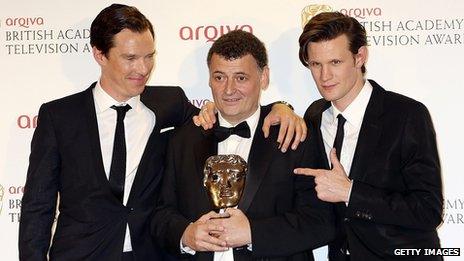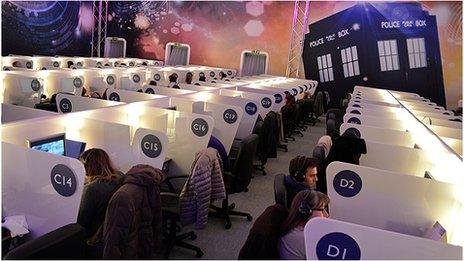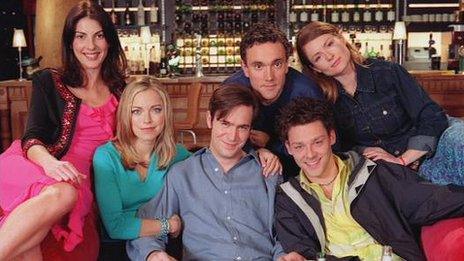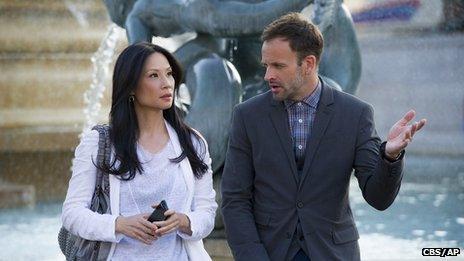Steven Moffat on the world of Doctor Who and Sherlock
- Published

Steven Moffat (centre) was accompanied by Sherlock's Benedict Cumberbatch (left) and Doctor Who's Matt Smith when he received a special Bafta Award
Doctor Who and Sherlock are Britain's most successful TV exports, being shown in more than 200 territories worldwide.
Steven Moffat, the man in charge of both shows, discusses British TV's global appeal and why a foreign Doctor Who remake would be "insane".
The Tardis looms over hundreds of tiny identical booths that are laid out in uniform rows, with each booth containing a figure staring intently at a screen.
This is not a scenario from an episode of Doctor Who.
This is the scene at the BBC Worldwide Showcase, a TV industry event in Liverpool, where global broadcasting executives come to decide which British programmes to buy for their channels.
The Tardis is painted on the wall, the figures are TV buyers from all over the world and they are intently watching hours upon hours of British TV.

Doctor Who's presence is felt at the BBC Worldwide Showcase in Liverpool
They also attend special screenings and parties with actors and executives, who try to sprinkle some stardust over proceedings in an attempt to persuade the visitors to buy their shows.
Steven Moffat may not be an A-list star, but he is one of the most popular people here.
He became executive producer and head writer on Doctor Who in 2010, while Sherlock, the updated detective drama he created with Mark Gatiss, seems to be the main name on the buyers' lips at the Showcase.
Moffat says he comes across episodes of Doctor Who "all the time" while abroad. "Doctor Who's everywhere," he says. "You can bump in to the Doctor anywhere."
Despite events like the BBC Worldwide Showcase and the sums of money to be made from selling programmes to foreign channels, Moffat says he does not write shows with overseas sales in mind.
"I don't think creatively it makes any sense at all to try to imagine selling your show to the rest of the world. You'd get it wrong anyway.
"Sherlock and Doctor Who are both doing rather well but they couldn't be more definitively British. They're obtusely British. They're about as British as it gets. You shouldn't be afraid of being British because that's what you're selling."
Before (almost) taking over the world with Sherlock and Doctor Who, Moffat earned his spurs in the TV industry with romantic sitcoms Joking Apart and Coupling.

Moffat's sitcom Coupling was remade around the world - but flopped in the US
Coupling, which was produced by Moffat's wife Sue Vertue and ran in the UK from 2000-2004, was remade widely, from Kenya to Canada.
"Sue and I would always let the rights to Coupling go for a reasonable fee so long as we got foreign travel out of it, to be quite honest," Moffat admits.
The most high-profile Coupling remake was in the US, where NBC hoped it would provide a replacement for Friends. It lasted for four episodes.
Moffat puts part of the blame for its short lifespan on network interference.
"I didn't like any part of that process," he recalls. "I was fairly against doing it at all because we were still making the British version and that just divides your thoughts.
"It wasn't terrible. I saw a cut of their episode three, which I thought was pretty good. Then it went to the network execs and they asked for some changes and it became terrible. So that may have been typical of the process they went through."

US network CBS made its own Sherlock Holmes series titled Elementary
Why do British shows need to be remade for the US anyway? Why did NBC not just air the British original?
"We mostly watch shows made by our own country," Moffat replies. "There are no shows from America that are big hits in Britain. They're all minor hits. Your mates may talk about them but no-one's watching them. They're getting squashed by the locally-made shows. Always."
Despite the buzz around the likes of Breaking Bad and Game of Thrones, he is right. The top 10 shows in the UK in 2013, external were all home-made.
The situation is "changing a little bit", however, Moffat continues. Although Doctor Who is a cult hit rather than a prime-time smash in most countries, it is so distinctive that it has become "unremakeable", he says.
"Doctor Who's probably penetrated enough that it's no longer regarded as an import, it's just that show."
US network CBS did make its own Sherlock Holmes series titled Elementary, external, starring Jonny Lee Miller and Lucy Liu. But it was not an official remake of the British series.
That is obviously a source of some contention for Moffat. "CBS approached us to remake our version," he explains.
"We declined, saying we weren't ready to do that. Shortly after that, they announced they were making an updated version of Sherlock Holmes. Those are the bald facts. I can't comment on how it turned out or the people that made it because I've never seen it."
At the time, Moffat was quoted, external as saying he may have to "take action" if Elementary turned out to be too similar to the British version.
"We don't own Sherlock Holmes," he now says. "We don't even own the idea of updating Sherlock Holmes. That's been done before, several times actually. So there's no action to be taken."
Have any foreign TV channels ever enquired about making their own version of Doctor Who?
"If anyone were to ask me, I'd say it's an absolutely insane idea," the producer replies.
"You couldn't have more than one Doctor Who in the world. It would just be dreadful."
- Published25 February 2014
- Published2 October 2013
- Published18 September 2013
- Published4 July 2012
- Published15 November 2012